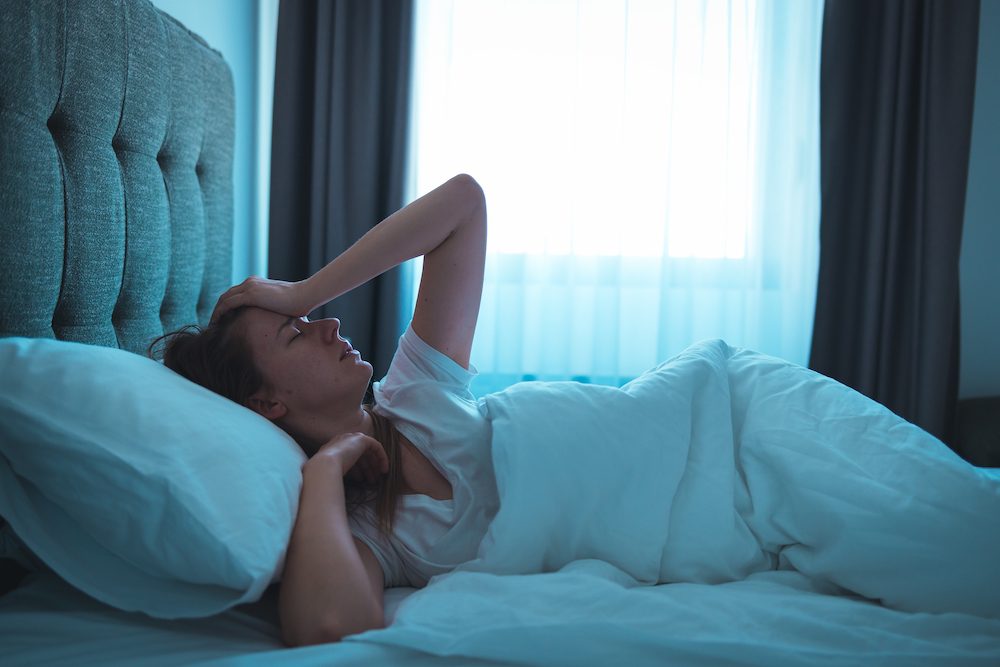Medical Disclaimer: The following content should not be used as medical advice or as a recommendation for any specific supplement or medication. It is important to consult your health care provider prior to starting a new medication or altering your current treatment.
Getting enough sleep is important to help maintain a healthy mind and body. For many people, getting adequate sleep can help them remain headache-free or keep headache symptoms from getting worse.
If you experience headaches after not getting enough sleep, it can be helpful to learn more about what may cause them and what steps you can take to help manage your symptoms.
Can Lack of Sleep Cause Headaches?
Headaches are commonly reported in people who do not get enough sleep. Ongoing research is still trying to fully understand the relationship between sleep deprivation and headaches. Studies have shown that it is likely bidirectional, such that a lack of sleep may contribute to headaches, while having headaches may disrupt sleep.
There are associations between headaches and some sleep disorders that can cause sleep deprivation, but researchers do not yet understand the reasons for these associations.
What Does a Headache From Lack of Sleep Feel Like?
There are various types of headaches, but tension headaches and migraines are two types of headaches that people may report when they do not get enough sleep.
Tension Headaches
People who do not get adequate sleep sometimes report waking up with a tension headache. Tension headaches are caused by over-contraction of the muscles in the face. People with tension headaches often feel tightening or pressure around the sides of their head.
There are many causes for tension headaches, including hunger, stress, and depression. Too little sleep may also be a trigger.
Migraines
Migraine headaches cause symptoms such as pain on one side of the head, nausea, and light sensitivity. While experts are not entirely sure what causes migraines, they do believe that abnormal nerve activity in the brain is a major contributor.
Some of the same brain structures and nerves involved in migraines also play a role in sleep. While there is an association between migraines and sleep, experts do not fully understand the relationship between the two. Sleep usually helps improve migraines, but lack of sleep and poor quality sleep are related to worsening symptoms.
There are several sleep disorders associated with migraines, such as insomnia, restless legs syndrome, and sleepwalking. Researchers do not completely understand why this is the case and suggest more work is needed to understand how sleep and migraines are related.
REM Stage Sleep and Headaches
There are four stages of sleep that people need to feel fully rested. Of these four stages, the final stage is called rapid eye movement (REM) sleep, which is the stage where dreams most commonly occur.
There are a few types of headaches that more frequently develop during REM sleep.
- Cluster headaches: These start quickly and last an average of 60 minutes. The symptoms of cluster headaches include eye watering and facial sweating. Changes in an area of the brain called the hypothalamus or the time of day may be possible factors.
- Chronic paroxysmal hemicrania: Symptoms of this headache are similar to cluster headaches, but bouts are shorter and happen more frequently. Experts are not sure why these headaches occur more commonly in REM sleep.
- Hypnic headaches: These headaches tend to affect people over the age of 50 and affect both sides of the head. Hypnic headaches may involve nausea or light sensitivity. A hypnic headache may awaken a person from sleep and may occur several times each night.
Headaches and Sleep Disorders
While lack of sleep can exacerbate headaches, sleep deprivation or a sleep disorder can lead to headaches.
Bruxism and Teeth Grinding
Bruxism is a condition where people grind their teeth or clench their jaw. It is common for this grinding and clenching to occur at night during sleep.
Migraine headaches are commonly reported in people with bruxism. Some studies suggest that this is because bruxism may activate nerves in the brain that are related to pain and headaches, but researchers are still exploring this relationship.
Sleep Apnea
Sleep apnea is a sleep disorder where the upper airway becomes obstructed at night. This can cause difficulty breathing, loud snoring, lower oxygen levels, and higher carbon dioxide levels.
Many people with sleep apnea have reported feeling tension-like headaches when they first wake up in the morning. Experts remain uncertain of the underlying cause of these headaches but do believe that high carbon dioxide levels, dilated blood vessels in the brain, poor sleep quality, and even high pressures in the brain may play roles.
Other Sleep Disorders
A handful of other sleep disorders are associated with headaches, including:
- Insomnia
- Narcolepsy
- Restless legs syndrome
- Sleepwalking
- Sleep-wake disorders
Researchers continue to investigate the connections between sleep and headaches to develop better treatment and prevention protocols.
People who have trouble sleeping and headaches should talk to a health care provider about their concerns. A health care provider may be able to evaluate for these and help develop a treatment plan.
Treating Sleep Deprivation Headaches
Doctors may suggest over-the-counter pain relievers as a treatment for temporary headaches. Medications that may be helpful include:
- Acetaminophen
- Aspirin
- Nonsteroidal anti-inflammatory drugs (NSAIDs) such as ibuprofen
You should always follow the manufacturer’s instructions on the label to determine how much and how often you should be taking any medication. It is also important to discuss options with your health care provider before starting any new medications, including those that do not require a prescription.
Other at-home strategies that may help manage headaches include:
- Resting in a dark and quiet room with your eyes closed
- Putting a cool compress, such as a damp cloth, on your forehead
- Drinking plenty of water throughout the day
- Relaxation activities such as deep breathing, massages, or guided imagery
Using a biofeedback device may also be helpful for managing headaches. A biofeedback device measures the tension in your muscles. Using this device can help you learn to be more aware of when you are tensing up your muscles, so that you can relax them.
How to Prevent Future Headaches
Headache prevention is important for people who regularly get headaches or have headaches that last a long time. There are a few preventive steps you can take before and during bedtime that may help reduce your chances of waking up with a headache.
Helpful habits may include:
- Following a regular eating and sleeping schedule each day
- Adopting techniques to reduce stress before bed, such as deep breathing
- Decreasing the consumption of caffeine throughout the day
- Reducing alcohol intake
- Avoiding smoking
- Adopting a regular exercise routine
- Avoiding anything that commonly triggers a migraine
It may also be helpful to keep a sleep diary that documents your daily activities, sleep habits, and when you wake up with a headache. This can help you identify any signs that you are not getting enough sleep and make changes that are specific to your lifestyle.
If your headaches do not resolve after adopting these changes, your health care provider can provide a more in-depth assessment and treatment plan to help you manage your symptoms.
References
Ask the Sleep Doctor
Have questions about sleep? Submit them here! We use your questions to help us decide topics for future articles, videos, and newsletters. We try to answer as many questions as possible. You can also send us an email. Please note, we cannot provide specific medical advice, and always recommend you contact your doctor for any medical matters.








